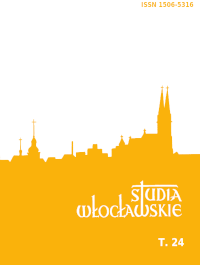Sanctifying the function of the Church and the right to the sacraments in the danger of death
DOI:
https://doi.org/10.52404/ttnwloc.stwl.24.23Keywords:
the right to the sacraments, the sacraments, the danger of death, the rights of the faithful, the duties of ministersAbstract
In order to exercise the right of the faithful to the sacraments, one must have an appropriate disposition (cf. can. 843 § 1 CIC). For this reason, the Legislator, in special situations in life, such as the moments of danger of death, changes the norms, and even suspends some, so that the faithful can receive the sacraments that are most needed for their salvation at that moment. The analysis of the possibility of receiving individual sacraments in danger of death is not only an exegesis of the applicable law, but also an attempt to answer the emerging difficult and doubtful issues. In this way, the highest law of the Church is realized, the salus animarum, which expresses God’s will and, as God’s law, determines other laws that must be subordinate to it. Therefore, an analysis of the legislation on individual sacraments in danger of death allows us to notice the implementation of this right, and at the same time to show the intention of the Legislator and the manner of proceeding in accordance with canonical equity in situations of doubt and in cases not regulated by canon law. The primacy of the right to salvation and the duty of the Church to sanctify the People of God must be the source and the highest standard of conduct for faithful ministers in danger of death, but also for intellectual disabilities, etc.
Downloads
References
Sobór Florencki, Bulla unii z Ormianami Exultate Deo, 22 XI 1439, w: Dokumenty soborów powszechnych, t. 3, red. A. Baron, H. Pietras, Kraków 2007, s. 493–543.
Sobór Trydencki, Kanony o sakramentach, 1547, w: Dokumenty soborów powszechnych, t. 4/1, red. A. Baron, H. Pietras, Kraków 2007, s. 357–361.
Sobór Watykański II, Konstytucja o liturgii świętej Sacrosanctum concilium, 4 XII 1963, w: Sobór Watykański II, Konstytucje. Dekrety. Deklaracje, Poznań 2002, s. 23–78.
Pius XII, Encyklika Mediator Dei, 20 XI 1947, https://opoka.org.pl/biblioteka/W/WP/pius_xii/encykliki/mediator_dei_20111947.html [08.03.2021].
Pius XII, Konstytucja apostolska Sacramentum ordinis, 30 XI 1947, https://opoka.org.pl/biblioteka/W/WP/pius_xii/konstytucje/sacramentum_ordinis_30111947.html [09.03.2021].
Franciszek, pap., List motu proprio Spiritus Domini, 10 I 2021, http://www.vatican.va/content/francesco/pl/motu_proprio/documents/papa-francesco-motu-proprio-20210110_spiritus-domini.html [12.03.2021].
Kongregacja Nauki Wiary, Deklaracja o kwestii dopuszczenia kobiet do kapłaństwa urzędowego, 15 X 1976, http://www.vatican.va/roman_curia/congregations/cfaith/documents/rc_con_cfaith_doc_19761015_inter-insigniores_pl.html [11.03.2021].
Kongregacja ds. Kultu Bożego i Dyscypliny Sakramentów, List „Prot. N. 2607/98/L”, 18 XII 1999, „Notitiae”, 35(1999), s. 537–540.
Komisja ds. Rewizji Kodeksu Prawa Kanonicznego, Coetus studiorum «De sacramentis» (series altera: sessio III), „Communicationes”, 10(1978), s. 81–82.
Katechizm Kościoła katolickiego, Poznań 1994.
Augustyn z Hippony, In Ioannis Evangelium, VI, 1,7: PL 35, 1428.
Bartnik C., Dogmatyka katolicka, t. 2, Lublin 2003.
Beal J., Coriden J., Green T., New commentary on the Code of Canon Law, New York 2000.
Blanco M., Commentary on c. 850, w: Exegetical commentary on the Code of Canon Law, vol. 3/1, red. A. Marzoa, J. Miras, R. Rodríguez-Ocaña, Montreal – Chicago 2004, s. 432–433.
Broglio T., Alcune considerazioni sulla «communicatio in sacris», „Quaderni di Diritto Ecclesiale”, 6(1993), nr 1, s. 83–91.
Frank E., I Sacramenti dell’Iniziazione, della Penitenza e dell’Unzione degli infermi, Roma 2012.
Ghirlanda G., Il diritto nella Chiesa mistero di comunione, Roma 2014.
Ghirlanda G., Il sacramento dell’Ordine e la vita dei chierici, Roma 2020.
Ghirlanda G., Ordine sacra, w: I sacramenti della Chiesa, red. A. Longhitano, s. 251–297.
Hendriks J., Diritto matrimoniale, Milano 2001.
Incitti G., Il sacramento dell’Ordine nel Codice di Diritto Canonico. Il ministero dalla formazione all’esercizio, Roma 2013.
Maffeis A., Penitenza e unzione dei malati, Brescia 2012.
Montini G., L’unzione degli infermi e la «communicatio in sacri», „Quaderni di Diritto Ecclesiale”, 9(1996), nr 3, s. 321–336.
Montini G., La morte come fine del mondo individuale. Il pericolo di morte nel diritto canonico: normativa e significato ecclesiologico, w: La fine del tempo. Quaderni teologici del Seminario di, vol. 8, red. G. Canobbio, Brescia 1998, s. 309–344.
Nowicka U., Szafarz sakramentu małżeństwa. Studium historycznoprawne, Wrocław 2007.
Pastuszko M., Najświętsza Eucharystia według Kodeksu prawa kanonicznego Jana Pawła II, Kielce 1997.
Pighin B.F., Diritto sacramentale canonico, Venezia 2016.
Plezia M., Słownik łacińsko-polski, Warszawa 1998.
Rincón-Pérez T., Commentary on c. 889, w: Exegetical commentary on the Code of Canon Law, vol. 3/1, red. A. Marzoa, J. Miras, R. Rodríguez-Ocaña, Montreal – Chicago 2004, s. 539.
Downloads
Published
How to Cite
Issue
Section
License
Copyright (c) 2022 Studia Włocławskie

This work is licensed under a Creative Commons Attribution 4.0 International License.




